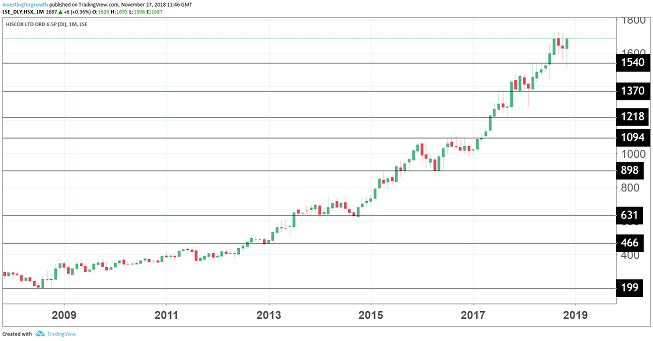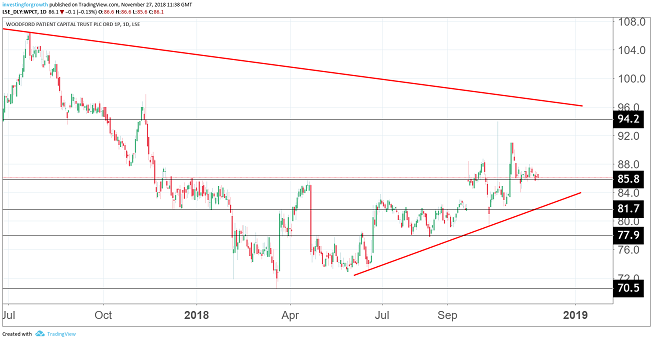FTSE reshuffle: Royal Mail and Neil Woodford in the thick of it
27th November 2018 11:56
by Lee Wild from interactive investor
Just days away from the next FTSE index reshuffle, interactive investor's head of equity strategy Lee Wild looks at the stocks likely to win promotion to the FTSE 100 and those on the way down.

Christmas is Royal Mail's busiest time of year, but the large-scale replacement of hand-written letters with email, means the company will almost certainly lose its place among the premier league of UK-listed stocks at the quarterly index reshuffle next month.
A shock profits warning from new chief executive Rico Back in October wiped out 20% of Royal Mail's market value within minutes. The share price subsequently fell below 300p for the first time, taking the slump since the peak in May to 53% and well below the 2013 IPO price of 330p.
After a recovery back to the float price, Royal Mail is still only the country's 117th largest listed company by market capitalisation, and over £400 million from safety. Even if we assume all other FTSE 100 constituents remain unchanged, it would currently require a 12% rally to guarantee Royal Mail’s survival in the top flight.
Without a miracle in the coming days, Royal Mail will be deserving of its reputation as a yo-yo stock – it was demoted from the FTSE 100 in September 2017 and promoted in March this year.
Rightmove is also in the danger zone, but would be unlucky to drop out of the top 100 at this reshuffle. Royal Mail must be replaced, however, and best candidate from the mid-cap ranks currently is Lloyds insurer Hiscox.

Hiscox monthly chart. Source: TradingView (*) Past performance is not a guide to future performance
Commuters might recognise the name from advertising hoardings, but they may not know just how well its shares have performed. Over the past 10 years, they're up around 750% and now worth almost 1,700p, valuing the business at over £4.7 billion.
After a benign first half of 2018, insurers have faced hefty claims following a series of hurricanes and typhoons, and the California wildfires could cost the industry several billion dollars. This will crimp growth during the second half, but Hiscox is a well-run business and on target to make its FTSE 100 debut in December.
There could finally be good news for Neil Woodford too, although the well-known fund manager won't be popping champagne corks until the outcome is official. Since peaking soon after launch in 2015, his Woodford Patient Capital Trust has gone from significant premium to net asset value to large discount.
And promotion to the FTSE 250 in October lasted less than one week when index compilers FTSE Russell admitted a mistake. Civitas Social Housing, not WPCT, should have replaced NEX Group in the mid-cap index after it was bought by CME Group.

Woodford Patient Capital Trust. Source: TradingView (*) Past performance is not a guide to future performance
Investing heavily in many unquoted companies carries huge risk, but some recent successes also demonstrate how the tide can change dramatically. Woodford's stake in US new energy technologies firm Industrial Heat has increased significantly in value, and the Nasdaq listing of cancer specialist Autolus went well.
Woodford's trust has increased in value by more than a fifth since March and is currently on track to re-enter the FTSE 250 index next month.
When companies are promoted to an index, their share prices tend to enjoy a short-term bounce, due to the fact that tracker funds, which aim to replicate the performance of the index, are obliged to buy into them.
The reverse is true of stocks being demoted: share prices fall as tracker funds automatically unwind their positions.
*Horizontal lines on charts represent levels of previous technical support and resistance. Trendlines are marked in red.
These articles are provided for information purposes only. Occasionally, an opinion about whether to buy or sell a specific investment may be provided by third parties. The content is not intended to be a personal recommendation to buy or sell any financial instrument or product, or to adopt any investment strategy as it is not provided based on an assessment of your investing knowledge and experience, your financial situation or your investment objectives. The value of your investments, and the income derived from them, may go down as well as up. You may not get back all the money that you invest. The investments referred to in this article may not be suitable for all investors, and if in doubt, an investor should seek advice from a qualified investment adviser.
Full performance can be found on the company or index summary page on the interactive investor website. Simply click on the company's or index name highlighted in the article.